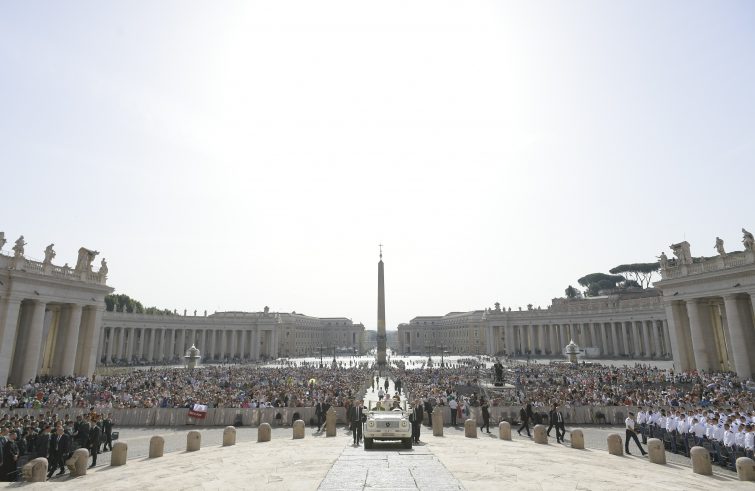
The Pope made yet a further appeal for peace during today’s general audience in St. Peter’s Square: “Today we are experiencing a world war, let us please stop!.” After the greetings to the Italian-speaking faithful, Francis remembered the “martyred” and “dear people of Ukraine” twice. “I call on each person to be a builder of peace and to pray that thoughts and plans of concord and reconciliation will spread in the world in the face of all the scenarios of war in our time”, the Pope said. The figure of St Ignatius of Loyola was the focus of the second audience on discernment, notably, a “decisive episode in his life”, occurred at home convalescing, after injuring a leg in battle.
“To dispel the boredom, he asks for something to read”, Francis said. “He loves tales of chivalry, but unfortunately only the lives of saints can be found at home. Somewhat reluctantly he adapts, but in the course of reading he begins to discover another world, a world that conquers him and seems to compete with that of knights. He is fascinated by the figures of Saint Francis and Saint Dominic, and feels the desire to imitate them. But the world of chivalry also continues to exert its fascination on him. And so, he feels within himself this alternation of thoughts – those of chivalry and those of the saints – which seem to equate to one another.” Ignatius, however, “also begins to perceive some differences”, the Pope noted referring to his autobiography, written “in the third person”, in which Ignatius writes: “When he thought of worldly things it gave him great pleasure, but afterward he found himself dry and sad. But when he thought of journeying to Jerusalem, and of living only on herbs and practicing austerities, he found pleasure not only while thinking of them, but also when he had ceased; they left him a trace of joy.” “The thoughts of the world are attractive at the beginning, but then they lose their lustre and leave emptiness and discontent; they leave you that way, empty. Thoughts of God, on the contrary, rouse first a certain resistance – ‘I’m not going to read this boring ting about saints’ – but when they are welcomed, they bring an unknown peace that lasts for a long time.”
“There is a development of discernment: for example, we understand what is good for us not in an abstract, general way, but in the journey of our life”,
Francis said in the context of Saint Ignatius’ Spiritual Exercises: “There is a history that precedes one who discerns, a history that it is indispensable to know, because discernment is not a sort of oracle or fatalism, or something from a laboratory, like casting one’s lot on two possibilities”, he pointed out: “The great questions arise when we have already travelled a stretch of the road in life, and it is to that journey we must return to understand what we are looking for.” Ignatius, when he found himself wounded in his father’s house, was not thinking of God at all, or of how to reform his own life. “He had his first experience of God by listening to his own heart, which presented him with a curious reversal: things that were attractive at first sight left him disillusioned, whereas in others, less dazzling, he found lasting peace. We too have this experience. This is what we must learn: to listen to our own heart, to know what is happening, what decision to make, to make a judgement on a situation, one must listen to one’s own heart.” This is why Ignatius will go on to suggest reading the lives of the saints.
“There is an apparent randomness in the events of life: everything seems to arise from a banal mishap.”
This is the other lesson of St Ignatius’ convalescence in his father’s house: “there were no books about knights, only lives of saints.” A mishap that nonetheless “holds a possible turning point. Only after some time will Ignatius realize this, at which point he will devote all his attention to it.” “Listen carefully”, the advice to the faithful: “God works through unplannable events that happen ‘by chance’, but ‘by chance’ this happened to me, and ‘by chance’ I met this person … God works through unplannable events, and also through mishaps.” Speaking off-text, the Pope gave a piece of advice to the faithful:
“Beware of the unexpected”,
“What is God saying to you? What is life telling you there? There is something to discern, how I react when faced with the unexpected. ‘I was quiet at home and my mother-in-law arrives; and how do you react to your mother-in-law? ‘I was working well in the office, and a companion comes along to tell me he needs money: how do you react?”. “See what happens when we experience things we were not expecting, and there we can learn to know out heart as it moves”, is Francis’ guidance. “Discernment is the aid in recognizing the signals with which the Lord makes himself known in unexpected, even unpleasant situations, as the leg wound was for Ignatius”, the Pope remarked: “A life-changing encounter can arise from them, forever. Something can arise that that makes you better along the way, or worse, I don’t know, but be careful; the most beautiful thread is given to us by the unexpected. May the Lord help us to hear our hearts and see when it is He who acts and when it is not, and it is something else.”










